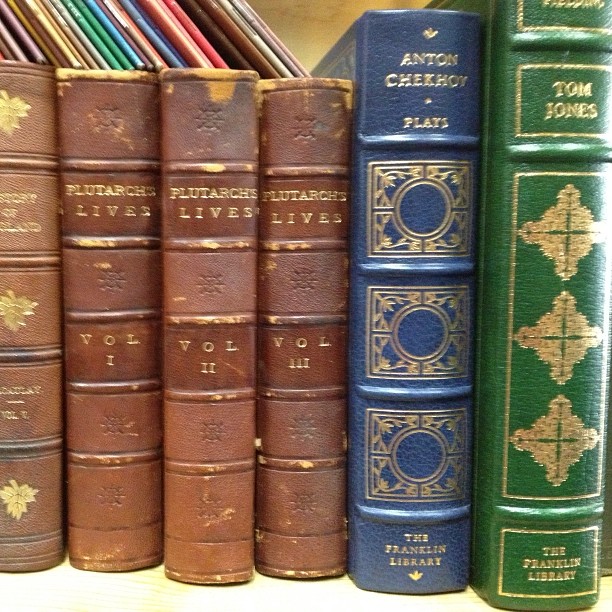Lecture Log
As long as I’m keeping a record of daily reading, I figured I ought to keep track of the academic lectures I’m taking in as well.
**Update: I’ve added a comment below explaining a bit about how these courses fit into my day.
***Update #2, 12/29/14*** Ack! I forgot to come back to this after March. This means I’ve forgotten things. Popped in today to add: A Day’s Read (The Great Courses), lecture 1: Kafka’s “The Country Doctor.”
Recently:
George Eliot: Intellect and Consciousness. Catherine Brown, Oxford.
Darwin and Design, Lecture 1. James Paradis, MIT.
American Novel Since 1945, Lectures 1-13. Amy Hungerford, Yale.
Introduction to Theory of Literature, Lectures 1-3, 5-6. Paul Fry, Yale.
In the past 18 months:
Modern Poetry, assorted lectures (I’m skipping around). Langdon Hammer, Yale.
The Civil War and Reconstruction Era. David Blight, Yale.
History 2D: Science, Magic, and Religion, Lectures 1-4. Courtenay Raia, UCLA.
MOOCs in progress with kids:
Moons, The Open University FutureLearn.
Shakespeare and His World (selected videos), University of Warwick, FutureLearn.
Live!: A History of Art for Artists, Animators and Gamers, California Institute of the Arts, Coursera.
Coursera courses on my own, in progress or last fall:
Scandinavian Film and Television. Multiple instructors, University of Copenhagen. Course in progress. Have watched vids for weeks 1-3 so far. Will probably not get all the way through before the course ends, as these lectures are a bit drier than others I’ve tried, but they’re quite interesting and I’m enjoying them—they just require a bit more focus because the visuals are very important (obviously).
Human Evolution: Past and Future. John Hawks, University of Wisconsin-Madison. Course just ended. Watched about half the videos. Loved how the professor traveled to various digs and fossil sites.
Plagues, Witches, and War: The Worlds of Historical Fiction. Bruce Holsinger, University of Virginia. Watched all videos, read several of the books. Great course!
Climate Literacy: Navigating Climate Change Conversations. Sarah Burch & Sara Harris, University of British Columbia. Did about 75% of the course—videos and readings. Showed several of the video lectures to my teens. I wish everyone I know would take this class. Hope it will be offered again.
Modern & Contemporary American Poetry. Al Filreis, University of Pennsylvania. Watched about half the videos, did corresponding readings. I adore this course and look forward to taking it again—in full this time—in the fall.
A Brief History of Humankind, Yuval Noah Harari, Hebrew University of Jerusalem. Lectures 1-4.
The Modern and the Postmodern. Michael Roth, Wesleyan University. Weeks 1-5. The reading load got to be more than I could juggle at that point in time but I very much enjoyed the lectures I watched.
CodeAcademy tutorials:
jQuery (23% completed)
Web Projects (89% completed)
HTML & CSS (completed)
***
There are so many appealing courses in literature alone (see this big list at Open Culture), not to mention all the classes I’d like to take in anthropology, history, art history, and various sciences. The Tolkien Professor’s Faerie and Fantasy class sounds especially fun! We were discussing these courses on Twitter this evening and a friend mentioned that she’d love to take one of these, but would be unlikely to finish. I seldom complete an entire course, as my Coursera record above demonstrates. But that doesn’t concern me; I consider each lecture I listen to a gain. I ran out of time to listen to all the Human Evolution lectures, but I learned a vast amount from the ones I did manage to watch. Ditto all the above. I’m exactly halfway through Amy Hungerford’s series on the modern American novel, and while I certainly hope to listen to the rest of the lectures, even if I don’t get back to them I’ve already gained a tremendous amount in terms of new knowledge and food for thought. This is unschooling for adults, and it’s exhilarating—learning as process, not product (that same philosophy that informs our homeschooling life).








